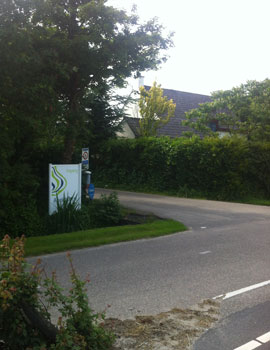Apeldoorn Bloembollen is a family concern, founded in 1928 by Theo Apeldoorn. When Theo was 16 years old, he started processing bulbs in the shack of his father, which was located in the centre of Egmond-Binnen in the province of North Holland. After 25 years this shack became too small and he moved to a bigger area just outside the city-centre. Around 1970 the sons of Theo, Jan and Piet took over the company .
Since 2009, as third generation in the company, Theo, Jan-Willem and Jan-Karel, along with 6 permanent employees, breed and grow various bulbs.
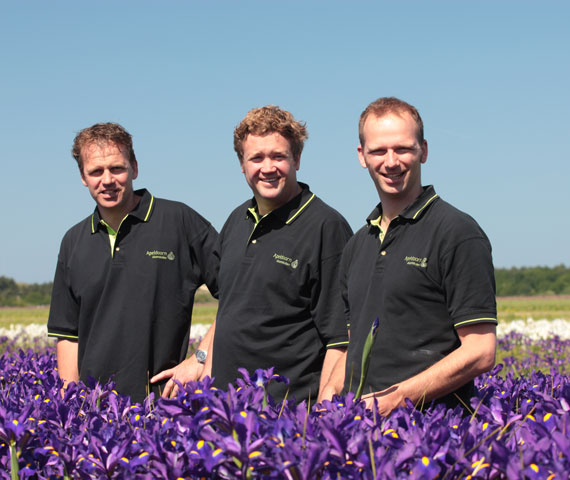
Apeldoorn Bloembollen cultivates a range of bulb crops in various colours, varieties and sizes. The bulbs are suitable for the markets in both the Netherlands and abroad, for planting in gardens and parks, cut flower production and potted plant production. Our customers are commercial companies and flower producers which ultimately sell the bulbs and pots to consumers.
As well as breeding bulbs, during the winter months we produce potted flowering bulb products. We largely use bulbs from our own nursery to produce these products. All of these products are sold through the Flora Holland flower auction.
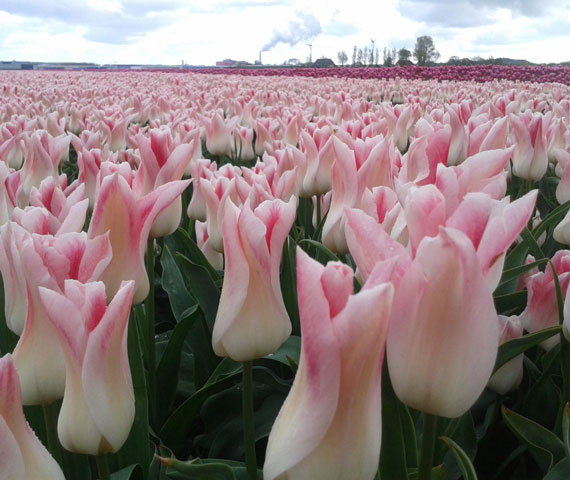
We shall shortly be celebrating a silver jubilee. 25 years ago, on July 20th
Kraakman started working for Apeldoorn Bloembollen. He then was only 23 years
old. We are very proud to have him in our team!
Thank you very much Ed for
serving all those years. Lets have another couple of years...
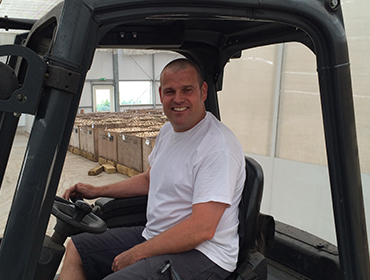
During the official state visit of China to the Netherlands, Peng Liyuan, wife of the Chinese president Xi Jingping, officially named our purple parrot tulip ‘Cathay’. She did this in the presence of her husband, Xi Jingping, King Willem-Alexander and Queen Maxima at Keukenhof Castle. ‘Cathay’ is the former name for China, and means prosperity and wealth.
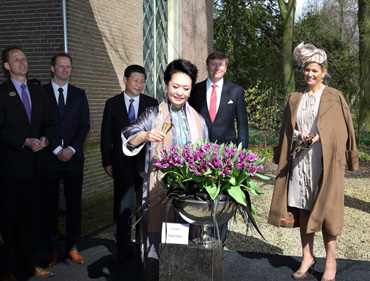
At our nursery, we breed a wide range of flower bulb crops in various varieties and sizes. Our bulbs are a high-quality product. We therefore endeavour to fulfil all quality requirements stipulated by Dutch and foreign governments.
We produce pots containing muscaris and narcissi in various pot sizes. The first pots are planted up on around the 1st the 1st of January, the potted flowering bulbs season starts and the pots are removed from the cold store and prepared for the auction. All of our potted flowering bulb products can be identified by their purple pots, which may or may not also include a plant label with product information. of September and are placed in the cold store. On
We grow the majority of bulbs within a radius of 15 km around Egmond-Binnen on sandy soil. The main advantage of sandy soil is that the bulbs can easily be processed and are clean, so are more attractive in terms of export. We have been growing our lilies since 2001 on the humus-rich sandy soils in the east of the country. This nutrient-rich soil ensures that the lilies will produce multiple flowers on each stem. This is a major benefit for horticulturalists.
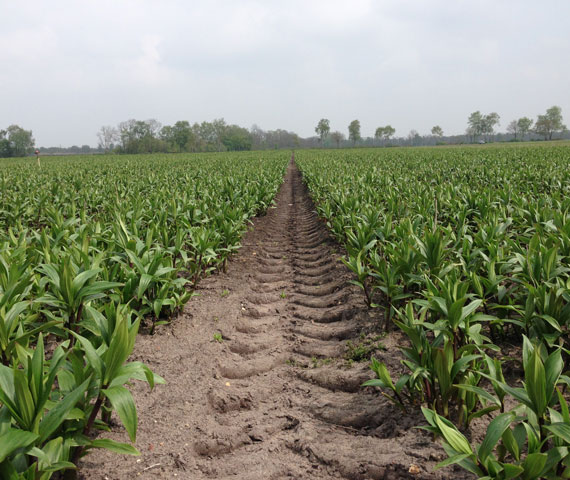
To prevent growing problems, it is essential that the type of crop on each plot of land changes each year. Every year this is quite a brainteaser. To make things a little easier, vegetables such as iceberg lettuce and endives are cultivated on our plots. But this is not enough to keep the soil in a good condition, rich and healthy. By sowing the plots with catch crops, such as oats, grass or oil radish we allow the soil to rest and ensure that the nutrients continue to be available for the next crop. To improve the structure of the soil, to reduce weed coverage and to combat vermin we sometimes flood plots. This is a very friendly way of treating the soil, which can only be applied in polder areas. Plots that are not located in the polders are actually not flat and therefore cannot be flooded. If necessary, in these areas, chemical soil treatment can be used.
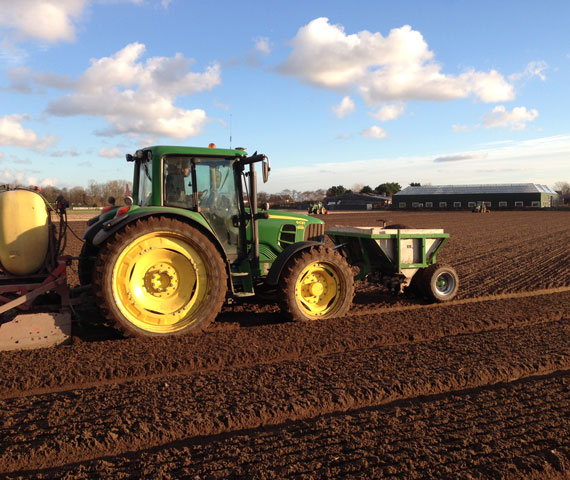
If the bulbs are going to be planted in November, the plots are covered with straw. This provides initial frost protection. The straw also prevents soil blowing off the plots. An additional benefit is that fewer weeds grow because the ground is covered. This is not enough to totally combat the weeds. To this end, we spray the crops against weeds. If the weeds grow too high, it will affect the crop growth.
During the growing season, we give the bulbs small amounts of artificial fertiliser. The amount depends on soil samples that show the levels of fertiliser in the soil. We spread artificial fertiliser using a machine that ensures that the granules land in the correct place. When the lilies blossom and the tulips are in full bloom, they are topped. We do this because the energy made by the plant goes directly to the bulb and the plant does not use the energy to form seeds in the flower.
As well as spraying to combat weeds, we spray the crops against fungi and aphids. Fungi on the crops cause premature death of the crops, meaning the bulb does not grow. Aphids are carriers of viruses. The quality requirements for the bulb crops are set so high by the Dutch and foreign governments that very little or no virus may be present in the bulbs. Today’s pesticides are not as strong as they were in the past. The requirements and the low concentration of pesticides mean that spraying has to be repeated frequently. From the time that the plants appear above ground until just before they are dug up, they are examined for viruses and other anomalies. All batches are inspected by the Bloembollenkeuringsdienst (BKD) (Flower Bulb Inspection Service) and, after approval, awarded a certificate. This enables a batch to be traced throughout the entire chain.
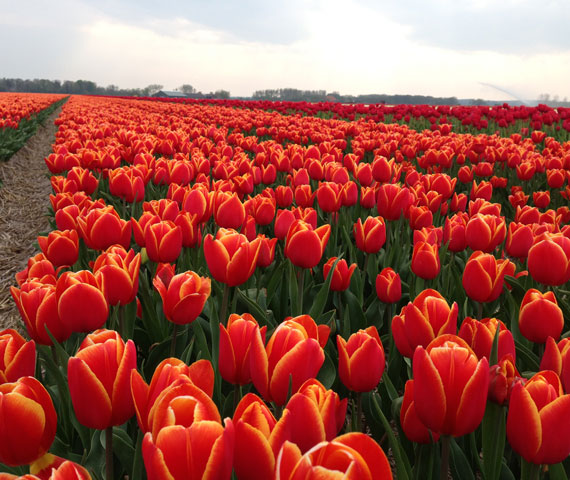
The bulbs are harvested as from early June. At our company in Egmond-Binnen, all of the bulbs are dried, cleaned, peeled, sorted, cultivated and prepared for transportation to our customers. They package the bulbs in unit packages for the retail trade, or the bulbs undergo treatment for flower production.
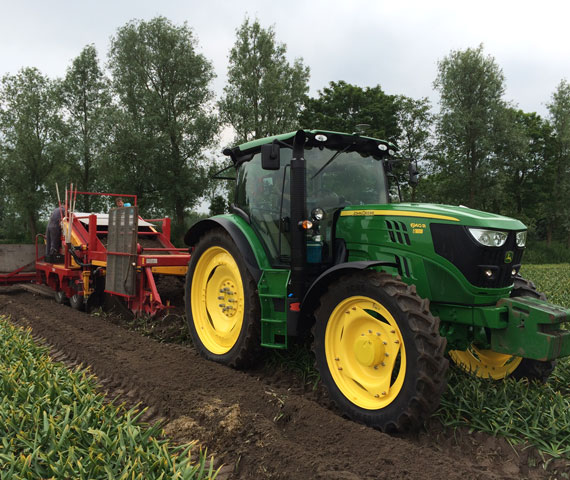
If you have any questions about one of our products, please contact us at 072 – 506 15 34 or complete the contact form provided below.
Apeldoorn Bloembollen vof
Herenweg 13b
1935 AA Egmond-Binnen
